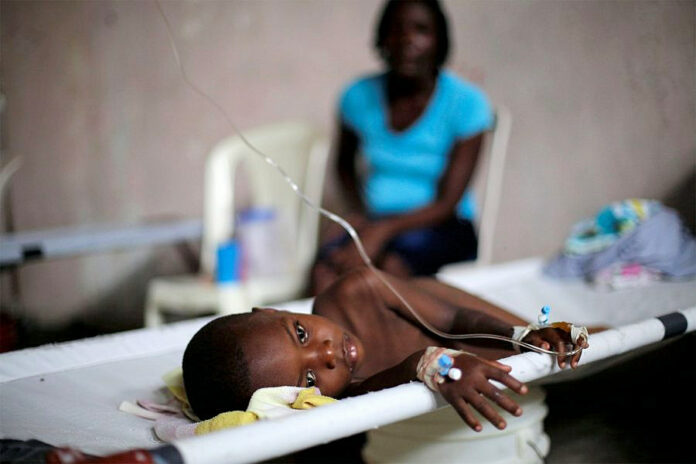
PORT-AU-PRINCE — At least seven people died in Haiti after contracting cholera, Dr. Lauré Adrien, general director of the Ministry of Health and Population (MSPP), said in an Oct. 2 press conference.
“The victims could not be evacuated in time when diarrhea and vomiting appeared,” Dr. Adrien said. “Among the victims of the disease is a child.”
The first cases were identified in Carrefour-Feuilles and Cité Soleil, particularly in the Brooklyn district, the MSPP said in a public note.
Cholera is a diarrheal illness caused by food or water contaminated with the Vibrio cholerae bacteria. Many residents do not have access to clean water because of a gas shortage caused by the high cost of oil and by the peyi lòk (locked up country) created by popular barricades throughout much of the capital and other cities in an effort to drive de facto Prime Minister Ariel Henry from power. The Revolutionary Forces of the G9, a federation of armed neighborhood groups, has joined the uprising and one of their barricade has blocked the Varreux Terminal, the capital’s main gas storage facility, since Sep. 21. Because of such barricades, some water purification companies, such as Culligan, are not operating.
The MSPP said it is taking care of infected and hospitalized people and implementing measures to prevent the disease’s spread.
Haiti had its first ever cholera outbreak in 2010, which killed at least 10,000 people, and infected hundreds of thousands more, according to the Centers for Disease Control and Prevention (CDC). Haiti held vaccination campaigns in a controversial effort to help reduce cholera’s spread. (The only truly effective way to stop the disease is to provide clean water.)
The MSPP said it is taking care of infected and hospitalized people and implementing measures to prevent the disease’s spread. The MSPP is urging residents to wash their hands with soap and water before handling food, drink water that has been treated with microbe-killing chlorine, protect their food from contamination, and use toilets with plumbing.
The United Nations admitted that the 2010 cholera outbreak was introduced to Haiti by Nepalese UN troops after they dumped raw sewage directly into the headwaters of the Artibonite River, from which thousands of Haitians routinely draw water for cooking, drinking, and washing.
The last confirmed case of cholera before this new outbreak was in February 2019. On Feb. 4, 2022, Haitian authorities celebrated the elimination of cholera and were hoping to receive an official certificate of elimination.
Any country that reports no confirmed cases of cholera for three years, while having a strict control system to also observe the evolution of the disease, receives a certificate from the World Health Organization (WHO). The MSPP has to submit a report on how they managed to spend three years without any confirmed cases of cholera for WHO to give them the certificate.
Despite the country being politically locked down and after the cholera cases were confirmed, the Ministry of National Education and Vocational Training (MENFP) maintained Oct. 3 as the first day of school, but almost no schools opened while students demonstrated in the streets. On Oct. 2, the MENFP said it”expects a progressive school start,” in a public note.
An earlier, shorter version of this article was published on the website of The Haitian Times.










